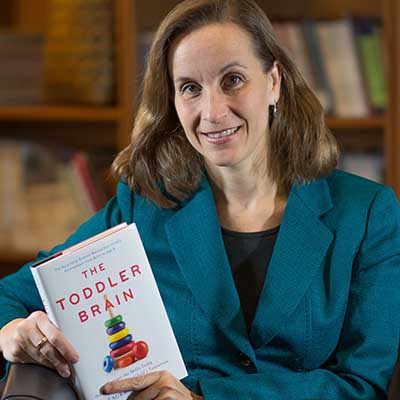 |
Laura Jana, M.D., with her book, “The Toddler Brain: Nurture the Skills Today That Will Shape Your Child’s Tomorrow.” |
Laura Jana, M.D., a pediatrician, director of innovation and associate professor at UNMC’s College of Public Health, proposes a parenting paradigm shift in her new book, “The Toddler Brain: Nurture the Skills Today That Will Shape Your Child’s Tomorrow.”
Here’s a synopsis — it applies well beyond toddlerhood, has less to do with the alphabet or numbers and more to do with ME, WE, WHY, WILL, WIGGLE, WOBBLE and WHAT IF.
Dr. Jana collectively likens these seven QI Skills (pronounced key) to the positive life force referenced in the “May the Force be with you” line of Star Wars fame.
Join the QI Skills conversation on Toddler Brain Facebook page.
“QI skills have been clearly identified as necessary for 21st century success, and their development starts much earlier than most people realize, in the first five years,” she said.
Book reading
Dr. Jana will read from her book 5-6 p.m. March 1 in the eighth-floor Rare Book Room, McGoogan Library. The campus bookstore will sell her book at the reading. It’s also available on Amazon.
The good news? The best way to cultivate QI Skills involves many things parents naturally do — including talking, cooing, singing and reading books to babies.
In connecting with business leaders, economists and entrepreneurs, she discovered that the skills most coveted in today’s workforce are the very same as those that are best nurtured in the first five years of life.
Watch Dr. Jana’s TED Talk: 5 Connections That Will Change Children’s Lives.
In today’s knowledge-based economy, these key competencies include curiosity, communication, collaboration, critical thinking, questioning, empathy, adaptability and the ability to fail.
In pre-school terms, those same competencies translate into such commonly practiced skills as “put your listening ears on, use your words, learn to play nice with others and in the same sandbox.” The modern-day board room looks and sounds surprisingly like the play room.
About Dr. Jana
Dr. Jana lives at a divergent intersection of health, education, business and innovation — in addition to having practiced pediatrics, she has a degree in cellular molecular biology; dabbled in neuroscience; worked and consulted with Dr. Benjamin Spock, the most trusted pediatrician of the 20th century; has written several parenting and children’s books; and owned and operated the first child care center in Nebraska to be accredited as a school. Oh, and she also reads the Harvard Business Review.
Consider the impact of this connection.
“It’s long been recognized that children spend the first years of life learning to read and the rest of their life reading to learn. The ability to read proficiently by third grade has been tied to everything from high school graduation and future economic success to a country’s global competitiveness and national security,” Dr. Jana said.
Now consider that a predictor of third grade reading scores is an 18-month-old’s vocabulary.
“It brings us back to the strategic foundational importance of caring, responsive adults and strategic 21st-century skill building right from the very start.
“That’s why it’s important for all of us — from parents to pediatricians to policy makers — to think strategically in terms of long-range goals and how best to raise a ready-for-life adult.”
